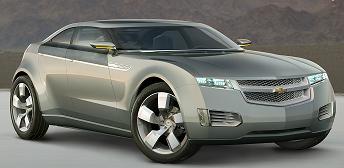GM Volt Electric Car
GM Volt Electric Car
General Motors plan a new electric car called the Volt with 40 mile range
home > transport | newsThe US carmaker General Motors has its sights on opening up a new market with its all electric car provisionally called Chevrolet Volt. This plug-in vehicle, still just a concept, would have a range of 40 miles on one charge - sufficient to meet the needs of almost 80% of drivers. The vehicle will be able to carry up to five passengers, and will cope well with hills and running air-conditioning unlike previous prototypes.
To increase its range, the Volt would also include an onboard generator powered by a turbo-charged 1 litre, 3-cylinder petrol engine with a 12 gallon fuel tank. When the batteries get low, the generator would kick in to recharge the batteries, but the car itself would always be powered by the electric motor. This gives an overall range of 640 miles (at around 50mpg) after which either the car needs recharging or refueling. Top speed for this electric car will be between 100 and 120mph.
To increase the green credentials of this vehicle, the petrol engine can be used to burn bio-ethanol E85, or replaced with a more efficient biodiesel engine or even with a hydrogen fuel cell.

GM hope that the technology behind the E-Flex System generator could in time be fitted to many of their other models. However, this technology is at best 2-3 years away yet, and some experts doubt it is feasible at all.
GM plan to use lithium ion batteries rather than NiMH which are more commonly used in electric and hybrid vehicles. Lithium battery technology provides more range than NiMH, however they need to be carefully maintained between 30 and 80% of charge if they are to last the lifetime of the vehicle. The current cost of a suitable lithium ion battery pack is around $10,000 which means that the Volt is not going to be cheap.
Batteries really are the sticking point with this concept since GM's desire for a battery pack which will last 10 years and 4,000 discharge/charge cycles is not matched by existing technology.
Charging the batteries would take just over six hours, and the car can be plugged into any standard power point for recharging. The electric motor can produce the equivalent of 160 horsepower (121kW) and provide plenty of torque.
Comment on this Article
If you have any comments on this article, please email them to neil@reuk.co.uk.Related Articles
Click one of the links below for further articles on the following relevant topics:transport, news.